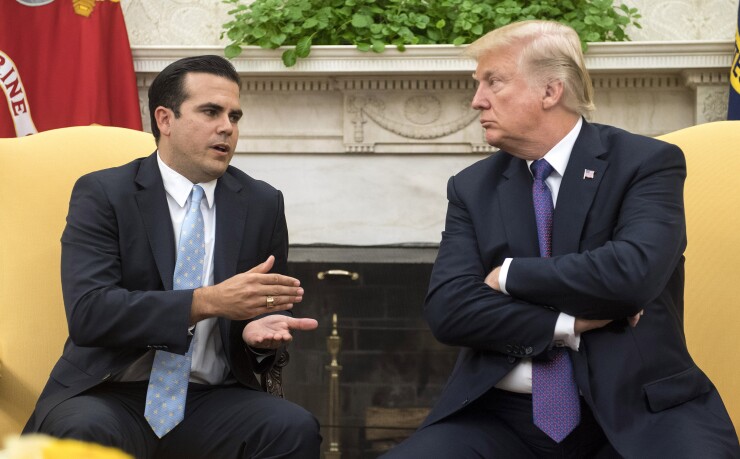Puerto Rico would get far less aid than its leaders say is needed under a White House request for $44 billion in disaster aid for the island, Texas and Florida, according to three congressional aides briefed on the plan.

Puerto Rico alone requested $94 billion in aid to recover from Hurricanes Irma and Maria, which left most of the 3.4 million residents without power. The biggest share of the funds, $31 billion, was to be used to rebuild homes, with another $18 billion requested for the electric utility, Governor Ricardo Rossello said in a letter to President Donald Trump released Monday.
Democrats earlier this month asked the White House not to request spending cuts to pay for the disaster aid and requested liquidity loans to help cash-strapped Puerto Rico pay its bills. The island is struggling to emerge from a record-setting bankruptcy.
Texas also would get less funding than it says it needs in the White House request, set to be made on Friday. Last month, Texas Governor Greg Abbott, a Republican, asked for $61 billion to repair damage from Hurricane Harvey.
Congress has already approved two bills totaling $52 billion in aid for the hurricanes. Those bills did not contain cuts to offset the spending.
Congress is likely to address the disaster request as part of a year-end spending bill needed to avoid a government shutdown. Current government funding runs out after Dec. 8, however a two-week stopgap is widely expected to extend that to Dec. 22.
Emails and phone calls to representatives of Puerto Rico’s governor and non-voting member of Congress weren’t immediately returned. A representative for the oversight board wasn’t immediately available to comment.
Almost two months after Hurricane Maria slammed into the U.S. commonwealth, most of the island’s households remain without power as the government prioritizes health-care facilities and other core infrastructure. San Juan has been better off than many rural areas, where the destruction was far greater. Meanwhile, the rebuilding of the power grid remains the island’s greatest financial challenge and a major political flashpoint in San Juan and Washington.
The island declared bankruptcy earlier this year after it said it couldn’t pay all of the $74 billion it owed to creditors. With many there still lacking basic services and its economy slowed to a halt, prices of Puerto Rico’s benchmark debt have tumbled to fresh lows as investors speculate that any payouts will be less than previously anticipated.
Puerto Rico is considering suspending debt-service payments for five years, a lead lawyer for the territory’s federal oversight board said this week, in the first indication of how the devastation caused by Hurricane Maria will affect the restructuring of the island’s debt.
A moratorium may be included as part of Puerto Rico’s plan to reduce what it owes through bankruptcy, Martin Bienenstock, a partner at Proskauer Rose LLP who represents the panel, said at a court hearing Wednesday in Manhattan. It wasn’t immediately clear whether such a step would apply to all of government’s $74 billion of debt.
"Bondholders need the island to turn the corner and start seeing some green shoots," said Matt Dalton, chief executive officer of Rye Brook, New York-based Belle Haven Investments, which manages $6.5 billion of municipal bonds, including insured Puerto Rico debt. "I would think that any money pouring into the island would be a good thing without focusing on what the total number is."
He said lawmakers may want to see the impact of the initial aid in Puerto Rico and could give the island more money later. "If you give them everything they want up front, they’re still likely to ask for more, because it’ll never be enough," Dalton said.
No matter how much the island gets, it won’t be enough, said Matt Fabian, a partner with Municipal Market Analytics. “Puerto Rico will likely be requesting aid this time next year," he said. Officials in the White House "probably think that that’s an incredibly generous offer."





